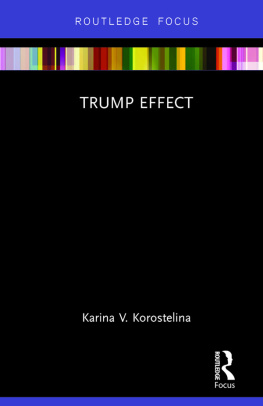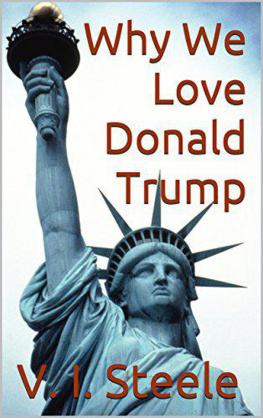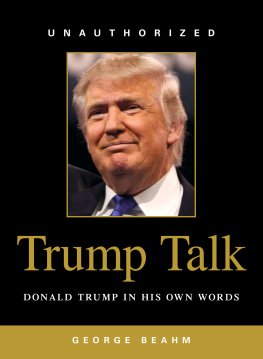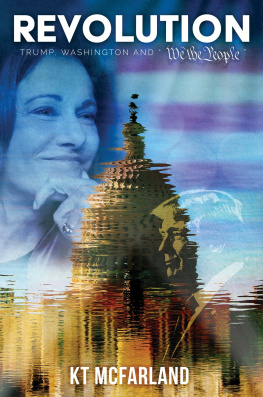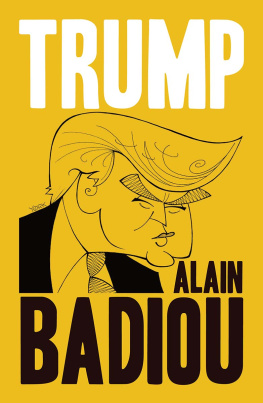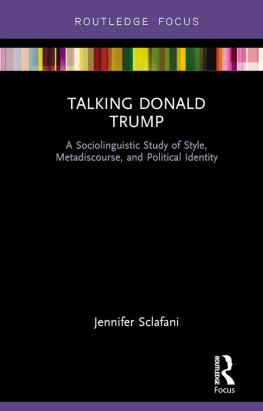Trump Effect
Professor Karina V. Korostelina presents insights into the Trump effect and explains how the support for Trump among the American general public is based on three complementary pillars. First, Trump champions a specific conception of American national identity that empowers his supporters. Second, Trumps leadership has, to an extent, been crafted from his ability to recognize where and with whom he can get the most return on his investment (e.g. his political comments) and address the perceived general malaise in the U.S. Trump also mirrors the emotions of a disenfranchised American public and inspires the use of frustration-based anger and insults to achieve desired aims. He addresses the publics intolerance of uncertainty and ambivalence by providing simpler solutions to complex national problems and by blurring the boundary between the leading political parties. Further, Trump employs existing political polarization and has established a new kind of morality. Third, Trump challenges the existing political balance of power within the U.S. and globally.
The overarching goal of this book is to show how the popularity of Trump has revealed substantial problems in the social, political, and economic fabric of American life.
Aimed at the general public and students in the U.S. and internationally, the book goes beyond many explanations of the Trump effect. Using a multidisciplinary theoretical lens, it provides a systemic multifaceted analysis based on multiple theories of social identity, emotions, cognitions, morality, and power to explain the broader social phenomena of the rise of individuals in society.
Karina V. Korostelina is a Professor at the School for Conflict Analysis and Resolution, and a Director of the Program on History, Memory, and Conflict at George Mason University. Professor Korostelina is a social psychologist whose work focuses on social identity and identity-based conflicts, intergroup insult, the nation building processes, role of history in conflict and post-conflict societies, conflict resolution, and peacebuilding. She is a recipient of thirty-nine fellowships and grants. She has edited six books and authored nine books and numerous articles.
When Donald Trump entered the primary race for the 2016 Republican nomination for the Presidency, most liberals thought it was either desperate self-promotion, or a political joke. None of us could see how a four-times bankrupted businessman or a three-times married playboy would ever be taken seriously by the Republican or the wider US electorate. In his campaign speeches, he transgressed most norms of acceptable racial, gender, religious, and political discourse. He encouraged violence at his meetings and hinted at wider social violence if he didnt receive the nomination, or later, win the election. This book explains how and why Donald Trump has managed to turn political transgression into political support from those who lack education and are excluded from economic and political power and influence. The unfortunate consequence of the Trump effect however, is that it has added to, or generated a license for irresponsible racist and xenophobic politics all around the world. This syndrome, therefore, needs to be understood by the whole world if we are to return to some 20th century notions of civilized political discourse, respect for human rights and an ethics of tolerance, care and hospitality rather than intolerance, callousness and exclusion.
- Kevin Clements, University of Otago, New Zealand
Karina Korostelina provides an insightful and comprehensive analysis of the fit between the resentments felt by a significant segment of Americans and Donald Trumps channelling of those resentments, his crude remedies for them, and his bullying manner. This is a timely and valuable book.
- Louis Kriesberg, Maxwell Professor Emeritus of Social Conflict Studies, Syracuse University, USA
Trump Effect
Karina V. Korostelina

First published 2017
by Routledge
711 Third Avenue, New York, NY 10017
and by Routledge
2 Park Square, Milton Park, Abingdon, Oxon, OX14 4RN
Routledge is an imprint of the Taylor & Francis Group, an informa business
2017 Taylor & Francis
The right of Karina V. Korostelina to be identified as author of this work has been asserted by her in accordance with sections 77 and 78 of the Copyright, Designs and Patents Act 1988.
All rights reserved. No part of this book may be reprinted or reproduced or utilised in any form or by any electronic, mechanical, or other means, now known or hereafter invented, including photocopying and recording, or in any information storage or retrieval system, without permission in writing from the publishers.
Trademark notice: Product or corporate names may be trademarks or registered trademarks, and are used only for identification and explanation without intent to infringe.
Library of Congress Cataloging-in-Publication Data
Names: Korostelina, K. V. (Karina Valentinovna) author.
Title: Trump effect / Karina V. Korostelina.
Description: Milton Park, Abingdon, Oxon ; New York, NY :
Routledge, 2017. | Includes bibliographical references and index.
Identifiers: LCCN 2016033938 | ISBN 9781138281462 (hbk) |
ISBN 9781315271170 (ebk)
Subjects: LCSH: Trump, Donald, 1946 | PresidentsUnited States
Election2016. | Presidential candidatesUnited States. | Political
cultureUnited States. | United StatesPolitics and government2009
Classification: LCC E901.1.T78 K67 2017 | DDC 973.932092dc23
LC record available at https://lccn.loc.gov/2016033938
ISBN: 978-1-138-28146-2 (hbk)
ISBN: 978-1-315-27117-0 (ebk)
Typeset in Times New Roman
by Apex CoVantage, LLC
To Charles, my husband and best friend, a partner in intellectual endeavors, and a fellow world explorer.
Contents
I want to express my gratitude to all my colleagues who supported me in this endeavor, especially to Sandra Cheldelin, Leila Dane, Daniel Rothbart, and Mara Schoeny. Special thanks to Kevin Avruch, the Dean of my home institution, the School of Conflict Analysis and Resolution, George Mason University, for creating the encouraging environment of creativity. The help of my graduate assistant, Laura Collins, was essential for the success of this project.
I am very thankful to my three reviewers whose detailed comments helped shape the book. I offer special thanks to Natalja Mortensen, senior editor at Routledge, for her support, professionalism, and efficiency at various stages of this work.
I also express my deepest gratitude to my husband, Charles, who inspired and supported me in writing this book and provided numerous invaluable insights and comments. I am very thankful to my daughter, Olivia, for her suggestions at the last stages of the writing. Discussions and conversations with them were the best part of this project.
People are largely united in their pursuit to make their communities, nations, and the world a better place. They are, however, often sharply divided over which beliefs and actions are needed to achieve it. In this pursuit, people adopt a set of beliefs and ideas that represent their own reality in the most satisfying way. This perception of the world typically represents the values they have developed over time and helps them explain current affairs and predict the future. People construct their version of reality based on several selected facts and certain interpretations. They purposefully choose to stress some matters while completely undermining other values, and they prefer to adopt some explanations of current events rather than others. People make these constructed realities meaningful for themselves through interaction with others, helping to crystalize their own beliefs into the facts and norms they use in their everyday social communication. These created realities then function as a framework defining peoples behavior. As a result, people follow particular authority figures while entirely mistrusting others.

